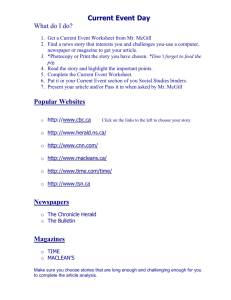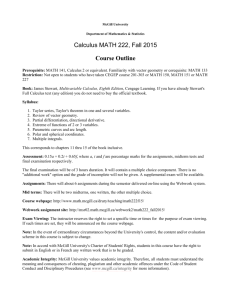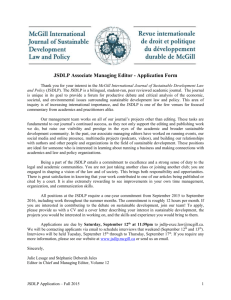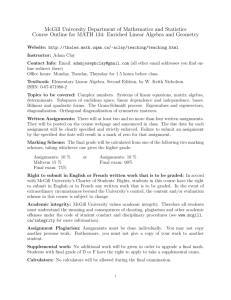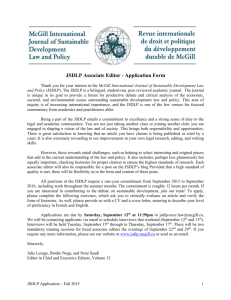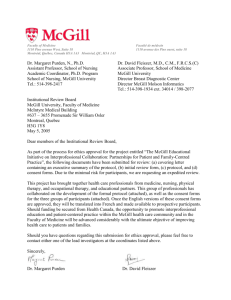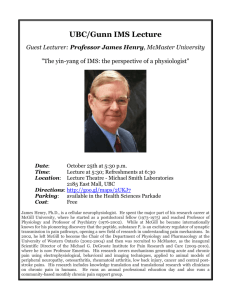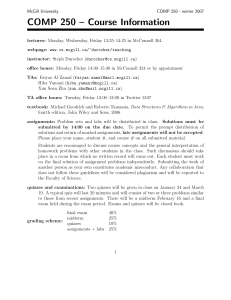GUIDELINES FOR WRITING THE STUDENT REPORT
advertisement
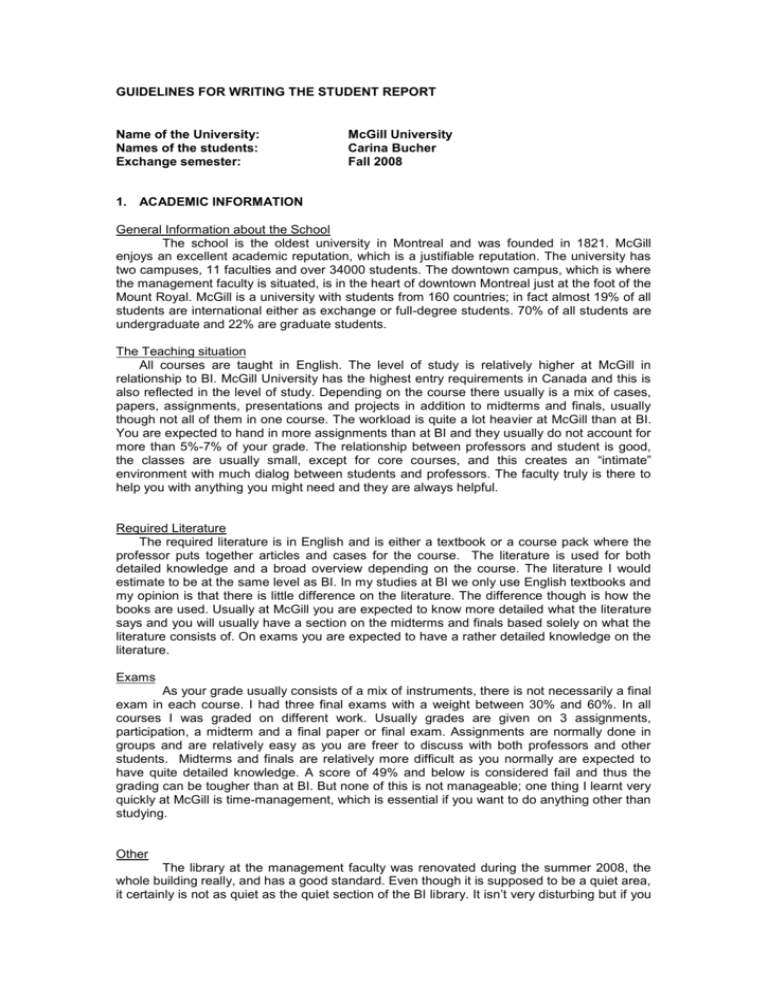
GUIDELINES FOR WRITING THE STUDENT REPORT Name of the University: Names of the students: Exchange semester: McGill University Carina Bucher Fall 2008 1. ACADEMIC INFORMATION General Information about the School The school is the oldest university in Montreal and was founded in 1821. McGill enjoys an excellent academic reputation, which is a justifiable reputation. The university has two campuses, 11 faculties and over 34000 students. The downtown campus, which is where the management faculty is situated, is in the heart of downtown Montreal just at the foot of the Mount Royal. McGill is a university with students from 160 countries; in fact almost 19% of all students are international either as exchange or full-degree students. 70% of all students are undergraduate and 22% are graduate students. The Teaching situation All courses are taught in English. The level of study is relatively higher at McGill in relationship to BI. McGill University has the highest entry requirements in Canada and this is also reflected in the level of study. Depending on the course there usually is a mix of cases, papers, assignments, presentations and projects in addition to midterms and finals, usually though not all of them in one course. The workload is quite a lot heavier at McGill than at BI. You are expected to hand in more assignments than at BI and they usually do not account for more than 5%-7% of your grade. The relationship between professors and student is good, the classes are usually small, except for core courses, and this creates an “intimate” environment with much dialog between students and professors. The faculty truly is there to help you with anything you might need and they are always helpful. Required Literature The required literature is in English and is either a textbook or a course pack where the professor puts together articles and cases for the course. The literature is used for both detailed knowledge and a broad overview depending on the course. The literature I would estimate to be at the same level as BI. In my studies at BI we only use English textbooks and my opinion is that there is little difference on the literature. The difference though is how the books are used. Usually at McGill you are expected to know more detailed what the literature says and you will usually have a section on the midterms and finals based solely on what the literature consists of. On exams you are expected to have a rather detailed knowledge on the literature. Exams As your grade usually consists of a mix of instruments, there is not necessarily a final exam in each course. I had three final exams with a weight between 30% and 60%. In all courses I was graded on different work. Usually grades are given on 3 assignments, participation, a midterm and a final paper or final exam. Assignments are normally done in groups and are relatively easy as you are freer to discuss with both professors and other students. Midterms and finals are relatively more difficult as you normally are expected to have quite detailed knowledge. A score of 49% and below is considered fail and thus the grading can be tougher than at BI. But none of this is not manageable; one thing I learnt very quickly at McGill is time-management, which is essential if you want to do anything other than studying. Other The library at the management faculty was renovated during the summer 2008, the whole building really, and has a good standard. Even though it is supposed to be a quiet area, it certainly is not as quiet as the quiet section of the BI library. It isn’t very disturbing but if you are disturbed by the occasional short conversation, just bring an iPod. Every faculty has a library and there also is a main library. All students have access to all the libraries. The main library has a section that is open all day and night during the whole year. Most libraries are open 24 hours in exam times. Students also have access to all the library’s resources and computers. There are many computers in all the buildings and students have access to all of these. Instead of BIs blackboard, McGill uses Minerva but it is not as actively used by all professors. Description of Courses FINE 342: Finance 2: 3 assignments, 1 midterm and 1 exam. Good instructor. Should have completed a finance course before. MGCR 382: International Business: 1 term project, 1 midterm, and 1 final. This is a core course. No prerequisites. MGSC 272: Advanced Business statistics: 3 assignments, 1 midterm 1 final. Excellent instructor. Should have completed at least one statistics course before. MRKT 483: International Marketing Management: 4 presentations, 1 term paper, and 2 midterms. May be beneficial with one marketing course before. MGPO 470: Strategy and Organizations. 4 assignments, 1 presentation, 1 midterm and 1 final. Good instructor. No prerequisites. As you are required to be on top of the prerequisites yourself, you need to be quite realistic regarding what is expected of you. Enrollment was not easy to do online, as mostly it is not possible to sign up without having the prerequisite courses from McGill. This problem was solved directly through the exchange students’ coordinator, who registered me onto all my courses directly only asking if I had the prerequisites needed. So there is nothing stopping you enrolling in courses that are too hard for you. It might be a good idea to send a mail to the coordinator with the courses you wish to take ask and them for help. 2. PRACTICAL INFORMATION ON THE SCHOOL AND THE EXCHANGE EXPERIENCE Information before you left The information package came less than a month after I was accepted to McGill. It is very useful to read through before you go. Visa Procedure and travel experiences There is no need for a visa if you are planning to study in Canada for less than 6 months. If you are going there for one semester you only need to bring a passport and the acceptance letter. Academic Calendar I ordered my tickets to arrive a few days before the start of Frosh (introduction week, much like Fadderullan), which was a good thing. This gave me the opportunity to find an apartment in good time. I only signed up for the faculty Frosh which I regretted doing. I would really advise you to sign up for SSMU frosh as well, the frosh for the whole school. Arriving early is very important as this gives you time to sort out your courses and find a place to live. The first day of the semester was 2 nd of September; I arrived the 23rd of August. Classes ended 2nd of December with exams to the 18th of December. The midterms were in October. Reception The school had information sessions for exchange students and this is where I meet my first fellow exchange friends. There are information sessions for the school, the international office and for the faculty. I attended all these and I found it to be very useful. They give you a lot of information on the technical details, for example how to get your student ID and health insurance. There was a meet-and-great for the exchange student at management, but this took place a month after semester start and by that time I had already meet many of the students. In many ways you are responsible yourself to make sure you get to know people, so do not wait for them to come to you. Housing I found my room through the McGill classifieds. Good sites are craigslist.ca, McGill classifieds and McGill off-campus housing. The latter has an office on campus where you can go and use the phone to find an apartment if you need this. The earlier you arrive the easier it will be to find housing. It is very important to not get stressed searching for a place to stay, book yourself a hostel room for the first week and don’t just take the first best thing because you are afraid not to get anything else. I was actively searching for an apartment for 3 days and the one I found was perfect, even though those 3 days seemed like an eternity for me. Costs The most important expenses are rent and books. You should be able to find a room for around $450 - $650 a month. Books vary between $30 - $120 a piece. There is a used bookstore, Haven bookstore, close to campus that might have the textbooks you need for half of the new price. On average the cost of living is lower than in Norway. Social Activities There is the McGill International Student Network (MISN) that organizes trips to for example New York and Boston. McGill has a vast amount of student organizations and clubs with activities ranging from knitting to rock climbing to language clubs. All you need to do is sign up. People are very outgoing and there is no problem making new friends. Join their group on facebook to get some information beforehand. Culture and Language Montreal is in the province of Quebec. Quebec is a French province and hence this is their main language. However very few people do not speak English and for example menus are usually bilingual. I do not speak French and managed just fine, and even picked up a bit of French during my stay. Cultural and Social Effects from the Exchange Experience I attend a well-diversified bachelors program at BI and was used to having many different nationalities around me before I left. Mostly I learnt how the educational system works in another country. I meet many new friends and had an incredibly rewarding experience. Even though McGill requires more of you in terms of the workload, I still found the time to do many things other than school. I would really recommend McGill to those who are ready to take on a challenge, McGill is not for the lazy student. McGill is known all over the world for its excellence and it will certainly benefit you to have McGill on your CV. Moreover Montreal is a great, vibrant city with many possibilities. If you are lucky enough to get accepted to McGill, you should not hesitate to make use of this fantastic possibility. Name and e-mail: Carina Bucher, carinabucher@hotmail.com
